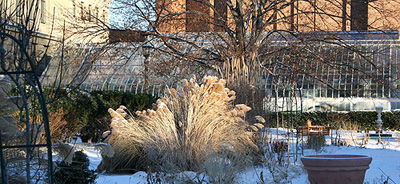 Two professors lead national climate report [Cornell Chronicle 1/31/2013] – Americans can expect more heat waves, heavy downpours, floods and droughts, sea level rise and ocean acidification, according to a draft national climate assessment report that included two Cornell researchers as lead authors. David Wolfe (right), professor of horticulture, was a lead author on a Northeast climate section, and Drew Harvell, professor of ecology and evolutionary biology, was a lead author of an oceans and marine resources section in the Federal Advisory Committee’s Draft Climate Assessment Report, released in January. “This document will be an essential science-based resource for decision-makers in our communities and businesses who are rolling up their sleeves to take on the challenges and build resilience to climate change,” said Wolfe, who chairs the Climate Change Focus Group at Cornell’s Atkinson Center for a Sustainable Future.
Two professors lead national climate report [Cornell Chronicle 1/31/2013] – Americans can expect more heat waves, heavy downpours, floods and droughts, sea level rise and ocean acidification, according to a draft national climate assessment report that included two Cornell researchers as lead authors. David Wolfe (right), professor of horticulture, was a lead author on a Northeast climate section, and Drew Harvell, professor of ecology and evolutionary biology, was a lead author of an oceans and marine resources section in the Federal Advisory Committee’s Draft Climate Assessment Report, released in January. “This document will be an essential science-based resource for decision-makers in our communities and businesses who are rolling up their sleeves to take on the challenges and build resilience to climate change,” said Wolfe, who chairs the Climate Change Focus Group at Cornell’s Atkinson Center for a Sustainable Future.
New agricultural research funding model gains momentum [Cornell Chronicle 1/31/2013] – Every dollar invested in agricultural research produces an estimated $10 in economic returns and helps feed a growing population, according to the USDA Department of Agriculture Economic Research Service. Thomas Burr, associate dean of Cornell’s College of Agriculture and Life Sciences (CALS) and director of the New York State Agricultural Experiment Station (NYSAES), appealed to growers to make an investment in the future of their industries at a panel discussion at the Empire State Fruit and Vegetable Expo in Syracuse, N.Y., Jan. 22. Burr says the commitment of private grower groups to invest in research is a bright light, and he envisions a model that would scale up these groups’ investments and ensure they are matched by the state.
Changes in epigenome control tomato ripening [Cornell Chronicle 1/29/2013] – Scientists at the Boyce Thompson Institute for Plant Research and the U.S. Department of Agriculture’s Agricultural Research Service have discovered a set of chemical changes to a plant’s DNA plays a pivotal role in tomato ripening, signaling to the fruit when the time is right to redden.

Wolfe and DeGaetano comment on Obama’s call for U.S. leadership on Climate Change [Cornell University Press Office 1/22/2013 – “It is very satisfying to see the top leadership of my own country, at long last, join the rest of the developed world in recognizing the importance this issue,” says David Wolfe, professor in the Dept. of Horticulture and the chair of the Climate Change Focus Group at Cornell’s Atkinson Center for a Sustainable Future. “Once the American people roll up their sleeves and get to work on this challenge, we will make things happen that will not only benefit our own economic development and national security, but will mobilize global action for a healthier and more prosperous environment for future generations.”


